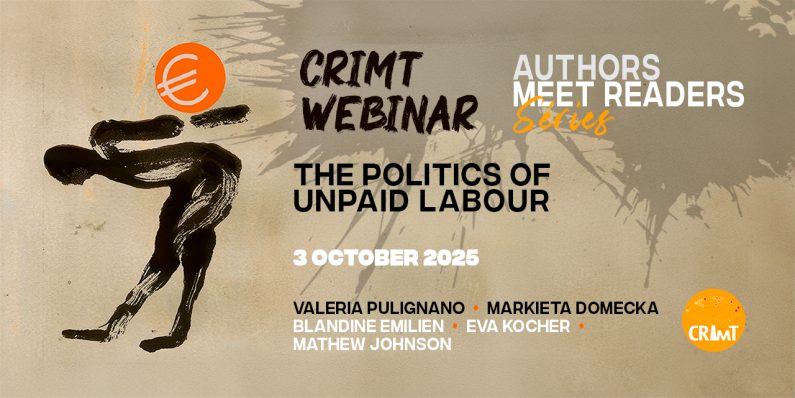We are pleased to invite you to an upcoming CRIMT webinar, organized as part of its “Authors Meet Readers” series. This session will focus on the new book by Valeria Pulignano and Markieta Domecka, The Politics of Unpaid Labour: How the Study of Unpaid Labour Can Help Address Inequality in Precarious Work, published in 2025 by Oxford University Press.
Representing both authors, Valeria Pulignano will take part in the webinar alongside three guest researchers — Blandine Émilien (University of Bristol), Mathew Johnson (University of Manchester), and Eva Kocher (European University Viadrina Frankfurt) — who will offer their perspectives on the book, informed by their own research. The discussion will be moderated by Dalia Gesualdi-Fecteau (Université de Montréal), Director of CRIMT.
The webinar will take place on Friday, October 3, 2025, from 9:30 AM to 11:00 AM (Montreal time), via Zoom. Registration is free but required at the following link:
Please note that the connection link will be sent by email upon registration.
Everyone is welcome to attend!
For a preview of the book, we invite you to watch the short video below and then read the summary.
Summary
This book introduces a theory of the politics of unpaid labour, advancing our understanding of inequality within the context of precarious work. Arguing that this theory can help address the inequalities perpetuating the dynamics and processes underpinning stigma which surround the rise of precarious work under labour market reforms and societal and technological changes, the book forges a link between the micro properties of the social system and its macro-level structural patterns. The former relates to the motivations and meanings individuals attribute to the unpaid labour they perform in a context where employment is precarious, while the latter refers to how individuals build resilience through sustaining unpaid labour by accessing resources found within the private, social, and financial sphere of the family as well as in regulatory arrangements at the level of the state and other social institutions. The book’s empirical section is based on extensive research comparing meanings of unpaid labour in creative dance, residential care, and online freelancing in Europe. The theoretical section advances current discussion in three ways. First, it establishes the characteristics differentiating employment from self-employment, and how these lead to a revised definition of unpaid labour. Second, it illustrates that unpaid labour is both shaped by class and serves to reproduce class interests, revealing ongoing changes in welfare, employment, and state institutional policies. Third, it considers the necessity to establish conditions within the labour market conducive to genuinely cultivating and honouring the diversity of human capabilities and actions within labour structures and promoting their manifestation.



